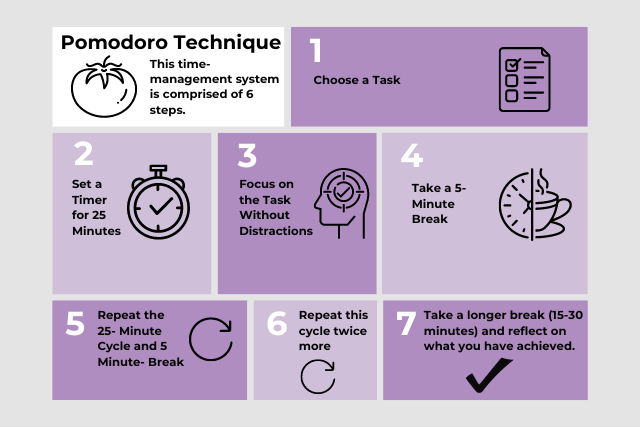How to Avoid Procrastination: 5 Ways to Improve Your Time Management
 Kathryn Williams
·
4 minute read
Kathryn Williams
·
4 minute read
Did you know that on an average working day you get distracted every 8-10 minutes?
Constant interruptions from your phone, email and the people around you can make it almost impossible to completely focus on the task at hand.
Just a couple of minutes of distractions each time soon adds up. Before you know it, you have lost an average of 2.1 hours a day.
So, how do we reduce these distractions to avoid procrastination and make the most of the time available? Continue reading to find out.
Contents:
What is Procrastination?
Procrastination is the act of delaying or putting off important tasks until the last minute, usually by focusing on less urgent or enjoyable activities instead.
For example, in the workplace, an employee might procrastinate by continually delaying a task despite its impending deadline. They struggle to bring themselves to begin the project until the day before, or a few hours before it’s due. They rely on the pressure of a tight deadline to motivate their work ethic.
Does this sound familiar? If so, keep reading to uncover our effective strategies for overcoming procrastination once and for all.
Why do we Procrastinate?
Procrastination isn’t a new concept. People have struggled with procrastination for thousands of years, so modern technology is not entirely to blame.
In 700BC, the early Greek poet Hesiod wrote "do not put things off till the next day or the day after. For a man who is an idle worker will not fill his granary by putting things off".
Psychologists have identified a number of root causes of procrastination, these include:
- Lack of structure
- Lack of motivation
- Feeling overwhelmed
- Anxiety
- Low-self confidence
- Perfectionism
- Neurodivergence
Whatever the cause of your procrastination, this behaviour can be managed with the correct knowledge, tools and support. First, you need to self-assess and identify areas to work on, and that's where we can help...
What is Distracting You?
Distractions can be split into two areas, internal and external:
Internal distractions
These are your own thoughts and emotions. This could include boredom, feeling fatigued and even hunger.
External distractions
These are distractions that originate outside of you: this can include other people, technology, or noises around you.
Top tip: Identify what your main sources of distractions are: create a distraction log – make a note of the typical interruptions and distractions that occur during a normal working day.
Ask yourself:
- What could you do to avoid or reduce these distractions?
- When do you get interrupted the most and the least?
- Are there certain times of the day where you’re more likely to be interrupted?
These details will help you decide a course of action to deal with these distractions.
How to Avoid Procrastination: 5 Top Tips
1. Switch Off All Notifications
The main culprit of external distraction today is technology.
Whether that be social media, emails, texts, phone calls – there are endless levels of distractions when it comes to being notified throughout the day.
Top tip: When focusing on a task, have all notifications switched off. Put your phone on do not disturb – or even better, put it out of sight completely. This will eliminate your urge to check it every minute, help enhance your focus and inevitably avoid procrastination.
2. Change of Scenery
Working at the same desk for hours on end can be demotivating and, to put it bluntly, boring.
The simple act of changing your working environment while trying to focus on a particular task can be very beneficial.
If your work has an agile working environment, that is even better.
You could book a meeting room for a couple of hours away from all distractions.
Or if you work from home, your options are a bit more varied: you could go to your local café or library. Or move from your desk to the sofa or kitchen worktop for a couple of hours. Even investing in a standing desk has it’s benefits for enhancing your focus and help you avoid procrastination.
Psst...you might be interested in our Top Benefits of Remote Working blog.
3. Decide if Interruptions are Important
Valid interruptions are an unavoidable part of your job. These could be pressing matters that need instant attention, even if you are trying to focus on your own tasks. These might include:
- If you’re responsible for a new starter, it is important that you are available to answer any questions or legitimate concerns they might have.
- Updates or questions from any team members regarding projects or collaborations you are a part of.
- If your child's school calls if there is an incident or update.
Invalid Interruptions are distractions you don't have to deal with immediately or at all. These might include:
- If a friend calls about making weekend plans. Some personal things like calling the bank, dentist or doctor can be done during work hours but weekend plans should wait till after work.
- Social media notifications - these can be switched off during work hours as suggested in tip number one.
4. Politely Say ‘No’
Do you respond to emails outside of your working hours? Or constantly say ‘yes’ to tasks and then get bombarded with further requests?
If you are too busy, you can politely decline a request or task. Or alternatively ask for an extended deadline.
Taking on too much can lead to work burnout, which is more damaging for you and your team in the long-run.
Some polite responses to declining a task may include:
-
“I’m glad you asked but I’m too busy to do that right now”
-
“I’m not able to do that now. Perhaps someone else may be able to help?”
-
“I don’t have my diary with me… can I get back to you later?”
-
“Can I let you know tomorrow?"
It’s better to say ‘no’ the first time, than let people down after you’ve already said ‘yes’.
5. Adopt Time Management Techniques
Improving your time management is the most effective solution to avoid procrastination.
3 top tips for improving your time management include:
1. Prioritise work: Ranking your tasks in order of importance is an effective way of organising your workload and ensuring that you are working most productively.
The Ivy Lee Method is a good example of a structure you can incorporate into your daily routine to help prioritise your tasks. It includes 5 simple steps:
2. Recognise When You Are Most Productive: We all have productivity cycles and times where we are more proactive. If your peak time is in the morning, this is when your most important tasks should be carried out. You should aim to get into a flow, where you can be completely immersed in what you are doing and therefore more likely to avoid procrastination.
See our blog: 5 Things That Promise to Keep Employees Happy and Productive
3. Set a Timer: Once you have an idea of what tasks you need to complete, try allocating time dedicated to completing a task. Set a timer either on your laptop or phone and give yourself a realistic amount of time to complete it. A technique that incorporates this is the Pomodoro Technique:
Also see our Top Six Time Management Tips for a More Productive Working Week blog.
Do You want to Learn How to Avoid Procrastination Within Your Team?
If you are looking to enhance your team's time management skills to improve overall productivity, our in-house team will be happy to help you acquire top quality training.
Our bespoke training offers tailored content, specific to your organisations' needs.
Click the banner below to submit an enquiry.


%20(1).jpg?width=1280&height=853&name=pexels-juan-pablo-serrano-arenas-1002693%20(1)%20(1).jpg)
-1.png?width=799&height=533&name=Interview%20Techniques%20(6)-1.png)




